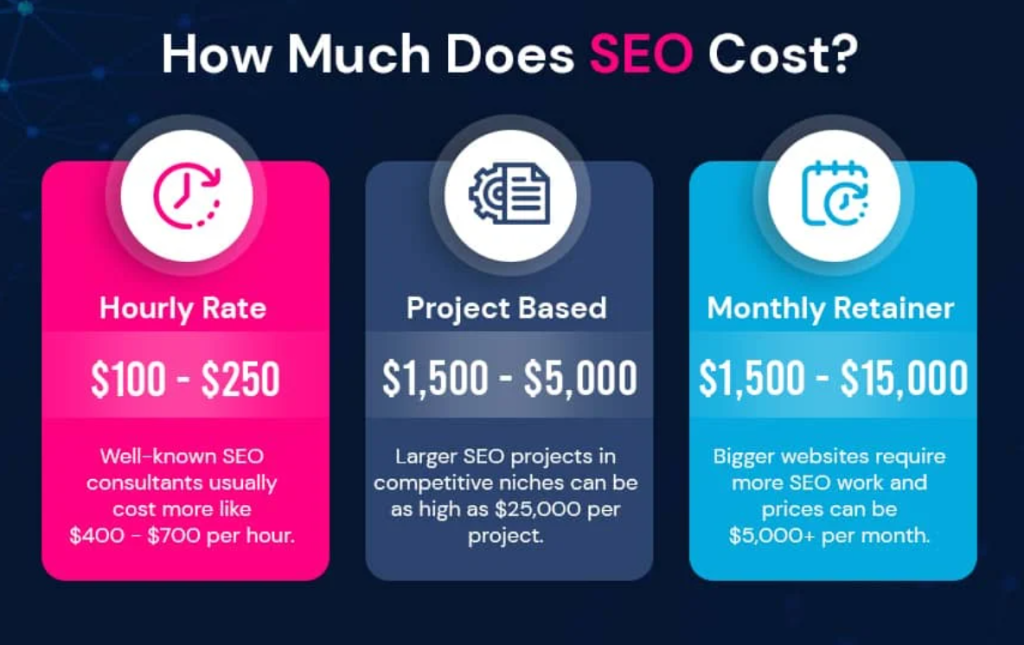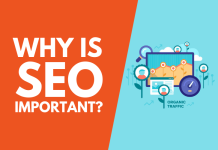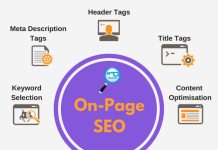Cracking the SEO Cost Conundrum
In the ever-evolving digital landscape, search engine optimization (SEO) stands as a pivotal factor in the success of businesses. From enhancing online visibility to driving organic traffic, SEO has become the lifeblood of digital marketing. It’s no wonder that entrepreneurs and website owners are eager to leverage the power of SEO. However, as they embark on this journey, one question often arises: “How much does SEO cost?”
Understanding the cost of SEO is crucial, as it can greatly impact your marketing budget and overall business strategy. In this article, we will delve deep into the enigmatic realm of SEO pricing. We will explore the key factors influencing SEO costs and various pricing models to help you make informed decisions.
Understanding the SEO Cost Factors
On-Page SEO Costs
When considering the cost of SEO, it’s essential to understand that it’s not a one-size-fits-all service. SEO cost factors can be categorized into On-Page and Off-Page elements, both of which are vital for a well-rounded SEO strategy.
Content Creation Costs: High-quality, relevant content is the backbone of SEO. Costs can vary based on the volume and complexity of content needed. Factors, like the number of web pages, blog posts, or product descriptions to be optimized, can impact these costs. High-impact keywords, infographics, and multimedia can also influence expenses.
Keyword Research Costs: Keyword research is the cornerstone of any SEO strategy. It involves identifying the right keywords that your target audience is searching for. Keyword research tools, competitive analysis, and the extent of your keyword list will affect the cost.
Technical Optimization Costs: The technical aspects of SEO encompass website structure, speed, and overall user experience. Costs depend on the extent of technical adjustments needed, from optimizing site speed to fixing broken links and ensuring mobile-friendliness.
Website Audit Costs: Before embarking on an SEO journey, a comprehensive website audit is necessary. This involves analyzing your site’s current performance and identifying areas that need improvement. The depth and complexity of the audit can influence the cost.
Off-Page SEO Costs
Off-page SEO focuses on factors that are external to your website but still impact your search engine ranking.
Link Building Costs: Backlinks from high-authority websites are a valuable asset in SEO. The cost of link building depends on the number of backlinks needed, the quality of the linking sites, and the complexity of the outreach process.
Social Media Costs: Social media plays a significant role in SEO by driving traffic and enhancing your online presence. Costs can vary depending on the platforms you choose, the content you create, and the frequency of your social media posts.
Online Advertising Costs: In some cases, businesses opt for online advertising to complement their SEO efforts. This can include pay-per-click (PPC) advertising, social media ads, or display advertising. The cost will depend on your chosen advertising method and the competition within your industry.
SEO Pricing Models
Now that we have a clear understanding of the factors contributing to SEO costs, let’s explore the various pricing models available:
Hourly Rates vs. Monthly Retainers: SEO agencies and freelancers often charge either by the hour or through monthly retainers. Hourly rates can vary significantly based on the expertise of the provider. Monthly retainers offer a fixed monthly cost for a set range of services.
Project-Based Pricing: Some SEO projects are well-defined and can be priced as one-time projects. This is common for website audits, site migrations, or specific optimizations. Project-based pricing is usually a one-time cost.
Results-Based Pricing: In rare cases, some SEO providers may offer a results-based pricing model. This means you pay based on the actual results achieved, such as improved rankings or increased organic traffic. However, this model can be risky for both the client and the provider, and it’s not common in the industry.
Factors That Influence SEO Pricing
Understanding the variables that influence SEO pricing is essential for making informed decisions. Several factors can affect how much you’ll pay for SEO services:
Industry and Competition: The competitiveness of your industry plays a significant role in SEO pricing. Highly competitive niches require more extensive and aggressive strategies, which can increase costs. Conversely, niche industries with lower competition may require less effort and, therefore, have lower associated costs.
Geographic Targeting: The geographical scope of your SEO campaign matters. Local SEO, targeting a specific city or region, may have lower costs compared to national or international SEO campaigns. Local SEO often requires less effort to rank in localized search results.
Website Size and Complexity: The size and complexity of your website impact the workload for SEO professionals. Large e-commerce websites or sites with intricate structures typically require more time and resources for optimization. This can translate to higher costs.
Quality of Service Provider: Not all SEO service providers are created equal. The expertise and reputation of the agency or freelancer you choose can significantly affect the cost. Established and reputable SEO agencies tend to charge higher rates but often deliver more effective results.
Common SEO Cost Ranges
Now that we’ve explored the key factors influencing SEO pricing, let’s delve into the typical cost ranges you might encounter:
Small Business SEO Costs: Small businesses often have limited budgets for SEO. Costs can vary, but a small local business might expect to pay anywhere from $500 to $1,500 per month for basic SEO services. Keep in mind that this is a general range, and actual costs can differ based on specific needs and goals.
Mid-Size Company SEO Costs: Mid-sized companies with more extensive websites and broader target audiences might pay in the range of $2,500 to $5,000 per month. This price range typically includes a more comprehensive SEO strategy and a higher level of competition.
Enterprise-Level SEO Costs: Large enterprises with complex websites and a global reach often require extensive SEO campaigns. Costs for enterprise-level SEO can range from $10,000 to $50,000 or more per month. These campaigns involve substantial resources, including dedicated teams and advanced strategies.
Evaluating SEO Proposals
When you receive SEO proposals, it’s essential to evaluate them carefully to ensure you’re getting value for your investment. Here’s what to look for:
What to Look for in an SEO Proposal:
- Detailed breakdown of services included.
- Clear pricing structure and payment terms.
- Realistic timelines for achieving goals.
- Case studies or references showcasing past successes.
- Customized strategies tailored to your business.
Red Flags to Watch Out For:
- Vague or undefined services.
- Promises of instant or guaranteed results.
- Overly low prices that seem too good to be true.
- Lack of transparency regarding the techniques and tools used.
- No provision for ongoing reporting and communication.
Selecting the Right SEO Partner
Choosing the right SEO service provider is pivotal to the success of your digital marketing efforts. Here’s a step-by-step guide to help you make an informed decision:
Step 1: Define Your Goals: Before searching for an SEO partner, have clear goals in mind. Determine what you want to achieve with your SEO campaign, whether it’s higher organic traffic, improved rankings, or increased sales.
Step 2: Research Potential Providers: Look for SEO agencies or freelancers with a proven track record. Explore their websites, read reviews, and request references. Investigate their case studies to see if they have experience in your industry.
Step 3: Request Proposals: Reach out to several potential SEO partners and request detailed proposals. Ensure the proposals outline the services they’ll provide, pricing, and expected outcomes.
Step 4: Ask Questions: Don’t hesitate to ask questions. Inquire about their strategies, reporting processes, and communication methods. A transparent provider should be willing to address your concerns.
Step 5: Consider Experience and Expertise: Assess the expertise of the SEO professionals. Experience in your industry and a thorough understanding of the latest SEO trends are valuable assets.
Step 6: Compare Pricing: While cost is a crucial factor, it should not be the sole determinant. Compare the pricing of different providers with the services they offer. Be cautious of prices that seem too low or too high.
Step 7: Review Contracts: Once you’ve made your choice, review the contract thoroughly. Ensure it includes all agreed-upon services, terms, and any guarantees. Be wary of providers who do not offer a clear contract.
Step 8: Ongoing Communication: Effective communication is essential throughout your SEO partnership. Regular updates, progress reports, and open lines of communication will help ensure you’re on the same page.

Monitoring and Adjusting Your SEO Strategy
Your SEO journey doesn’t end once you’ve chosen a provider. Monitoring and adjusting your SEO strategy is a continuous process:
Regular Performance Tracking: Monitor the performance of your SEO campaign using tools like Google Analytics. Pay attention to organic traffic, keyword rankings, and conversion rates.
Review and Adapt: If you’re not seeing the desired results, don’t hesitate to discuss adjustments with your SEO partner. SEO strategies may need to be refined based on data and changing industry trends.
Stay Informed: The SEO landscape is constantly evolving. Stay informed about the latest SEO updates and trends. Your SEO partner should also keep you updated on industry changes.
The Return on Investment (ROI) of SEO
One question that often arises when considering SEO costs is, “What will be the return on my investment?” Understanding the potential ROI of SEO is essential. Here are some points to consider:
Long-Term Benefits: SEO is an investment that offers long-term benefits. While it may take some time to see substantial results, the steady flow of organic traffic and improved rankings can provide a consistent ROI over time.
Measuring ROI: To measure the ROI of your SEO investment, track metrics such as organic traffic, conversion rates, and revenue generated from organic search. Compare these figures to your SEO costs to determine your return.
Cost-Efficiency: Compared to other digital marketing methods like paid advertising, SEO often provides a more cost-efficient solution. It may require a higher upfront investment, but over time, the ongoing costs tend to decrease as rankings improve.
The Evolving Nature of SEO Pricing
It’s crucial to understand that SEO pricing isn’t static. The landscape of SEO is constantly evolving, and so are the associated costs. Factors like algorithm updates, changes in competition, and shifts in digital marketing trends can impact SEO pricing.
Algorithm Updates: Search engines frequently update their algorithms. These updates may require adjustments to your SEO strategy, potentially affecting costs. A capable SEO partner should stay up-to-date with these changes.
Competitive Landscape: As your industry’s competitiveness changes, your SEO requirements may also change. More competition may necessitate a more extensive and costly SEO campaign.
Trends in Digital Marketing: The evolution of digital marketing trends, such as the increasing importance of mobile optimization and voice search, may influence the components and costs of your SEO strategy.
Final Thoughts
In the quest to unravel the intricacies of “How Much Does SEO Cost,” it’s essential to recognize that SEO is an investment, not an expense. It’s an investment in the growth and success of your business in the digital world. While the costs may vary, the potential returns can be substantial.
Choosing the right SEO partner, staying informed about industry changes, and actively monitoring your campaign’s performance will help you make the most of your investment. Remember, the true value of SEO goes beyond just rankings and traffic; it’s about achieving your business objectives, from increased sales to greater brand visibility.
As you venture into the world of SEO, equip yourself with knowledge, choose your partners wisely, and be prepared to adapt to the ever-changing digital landscape. The question of “How much does SEO cost?” will be answered not just in dollars but in the growth and success of your online presence.
FAQs
Let’s address some common questions that people have regarding SEO costs:
FAQ 1: Is there a standard price for SEO services?
- No, SEO pricing varies widely based on factors like industry, geographic targeting, and the scope of work. There’s no one-size-fits-all price.
FAQ 2: How do I know if I’m paying too much for SEO?
- Compare quotes from multiple providers. Be cautious of extremely high or low offers. Look for a transparent breakdown of services.
FAQ 3: Can I do SEO on my own to save money?
- DIY SEO is an option, but it requires time, expertise, and ongoing effort. It’s essential to assess whether it’s more cost-effective than hiring a professional.
FAQ 4: What’s the difference between cheap and expensive SEO services?
- Cheap services may cut corners, use outdated techniques, or lack transparency. Expensive services typically offer more comprehensive strategies, dedicated teams, and better results.
FAQ 5: How long does it take to see results from SEO?
- SEO is a long-term strategy. While you may see some improvements in a few months, substantial results often take 6 to 12 months or longer.




